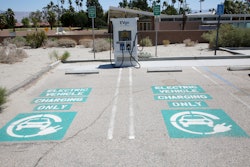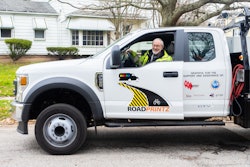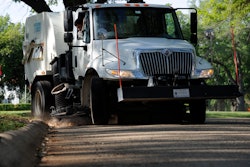
Lawmakers in Washington have debated in great length about how to pay for the Infrastructure Investment and Jobs Act (IIJA) as well as making sure the Highway Trust Fund (HTF) remains solvent.
Currently, some funding for the HTF comes from a 18.4 cents per gallon on gasoline and 24.3 cents per gallon on diesel fuel, which has not been raised since since 1993 and President Biden has said no to an increase. Other modes of funding, like a national vehicle miles traveled (VMT) tax are critical because inconsistencies between tax revenues and highway expenditures will get worse as fuel efficiency improves and EV adoption grows.
One program officials are planning to pilot, is a national motor vehicle per-mile user fee, which is laid out in the current bipartisan bill that passed in the Senate.
States Leading the Charge
A VMT tax charges motorists based on their road usage measured in mileage through a telematics device to capture distance driven by a vehicle through GPS. Some states have already put this tax program into effect.
Oregon has operated their OReGO program since July 1, 2015. According to their 2017 Oregon Road Usage Charge Report, "Volunteers who enroll in the OReGO program self-install a mileage reporting device in their vehicle and are charged 1.5 cents per mile driven. Fuels tax paid at the pump is treated as a pre-payment of road charges and credited to volunteers’ accounts. Volunteers can choose between GPS or non-GPS devices." In OR, more than 1,300 vehicles have enrolled in the program statewide and plan to make the program mandatory for all new vehicles starting in 2026.
Other states including California, Washington and Colorado have previously conducted pilots. However, in the text of the current IIJA, states could receive a grant to solicit volunteer participants that represent geographically diverse regions from all 50 States, including urban and rural areas. If the IIJA gets passed (still has to be approved by the House, then President Biden), the pilot program would receive $10 billion dollars between 2022 and 2026.
Opportunities and Obstacles to VMT
Fuel consumption used to be a good representation for road use, however it isn't any more because of an increase of fuel-saving, eco-friendly modes of transportation. With infrastructure funds dwindling, officials are looking at ways to replenish the HTF and other funding mechanisms to ensure America's highways, roads and bridges get the rehabilitation they desperately need.
Advantages to a vehicle miles traveled tax include:
- It would be fair across all vehicle types - From a funding perspective, it would be formed as a true user-fee instead of paying road taxes at the fuel pump, drivers would pay based on how much they drive
- This type of tax is better at targeting those who drive more frequently
- Greater fuel economy would have less effect on a VMT tax, consequently raising more revenue for infrastructure projects
AASHTO sent a letter to Congress in April, 2021 in support of a VMT implementation program.
"A national implementation program should work in cooperation with the public and private sector to address national implementation issues, such as standards for data collection, user equity, interoperability, administrative structure and costs, and public acceptance. Once these issues are resolved and recommendations for moving forward are made, a system must be tested in an interoperable, national setting."
The organization also provided an ideal testbed — The United States Postal Service.
Disadvantages to a program like this include:
- Privacy concerns about the potential tracking of movement and location of motorists by the government
- Installing some type of technology in all personal and commercial cars and trucks in the United States could cause administrative difficulties
- Rural drivers will have contrasting impacts which would cost them more as they tend to drive more than those in the urban areas
For the pilot program text in the bill, Transportation Secretary Pete Buttigieg will coordinate collection tools such as third-party onboard diagnostic devices, smartphone apps, telemetric data or any other methods considered appropriate. The bill does not provide provision for the privacy of the data or how to keep the information collected safe.
Infrastructure can't wait, technology and vehicles continue to evolve, there needs to be a relevant option to fill the funding void and a vehicle miles traveled tax might be a viable option. Conversations will continue in Washington and as they do, the Editors of ForConstructionPros.com will cover this topic along with other infrastructure related content as the bill continues to move through the legislative process.




















